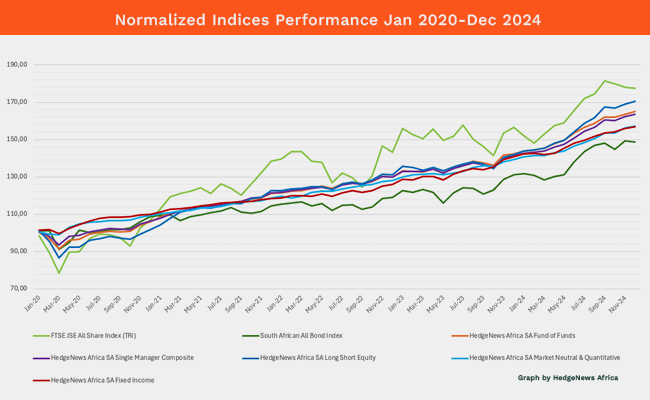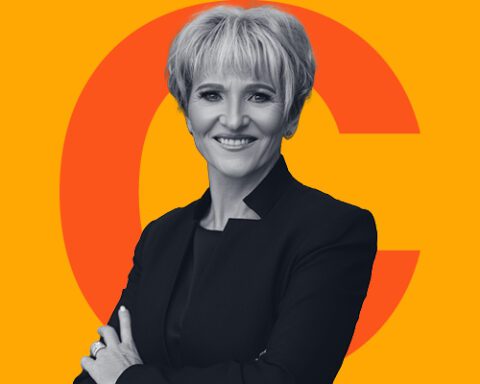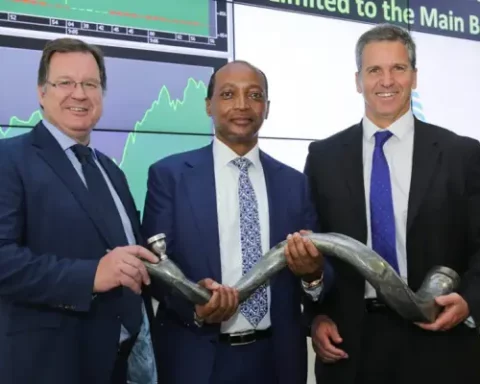South African hedge funds delivered their strongest performance on record last year, achieved unprecedented asset growth, and saw double-digit net inflows for the first time. They were also largely shunned by most investors.
Yet with global markets upended by geopolitical tensions, concerns over the US economy and unpredictable policy signals from US President Donald Trump, now may be an opportune time to take a closer look.
Hedge funds offer what traditional funds often cannot: the potential to protect investment portfolios against losses when markets fall. Their ability to use a wide range of strategies – including profiting from both rising and falling markets – makes them especially valuable during times of uncertainty.
“If you’re well-protected on the downside, you don’t have to recover as much as the equity market to actually make money,” says Elmien Wagenaar, the founder of THINK.CAPITAL, a 10-year-old boutique hedge fund manager. “That has a compounding effect … That’s why I believe that in volatile environments, hedge funds perform better.”
Hedge funds account for just R185.1bn of South Africa’s R3.87-trillion collective investment scheme market, which includes unit trusts. That’s a slow uptake considering that the country was the first in the world to regulate them, in 2015.

The industry gained notoriety in the past as aggressive and opaque, reinforced by high-profile failures such as that of Long-Term Capital Management in 1998. High fees, secrecy, limited access and complex strategies contributed to perceptions that hedge funds were only for the ultra-wealthy and too risky for the average investor.
That’s changed, says Wagenaar, whose RCIS THINK Growth QI Hedge Fund won the HedgeNews Africa award for the Best Fund of Hedge Funds in South Africa over the 10 years to end-December 2024.
South African hedge funds today are more focused on stable, risk-adjusted returns. THINK.CAPITAL’s fund delivered an annualised return of 10.14%, outperforming the JSE all share TR index (9.03%) and the all-bond index (8.68%). It did so with lower volatility: 5.37%, compared with 14.38% for the JSE and 8.28% for the bond index.
This resilience reflects the reality that, as an emerging market, South Africa’s stock and bond markets are relatively volatile – making capital preservation and loss mitigation critical. Many hedge funds now prioritise risk management over chasing returns. South Africa’s sophisticated financial system also gives managers the tools to achieve this.
Wagenaar says this risk-based approach dates back to the early 2000s, when hedge funds were primarily used by institutional investors such as pension funds, which favoured steady, sustainable returns over aggressive growth.
Her firm offers a fund of hedge funds, which pools together capital from investors and then allocates the money to different hedge fund managers.
In her opinion, investors should invest their full allocation of 10% into hedge funds, though post-retirees, in her view, should go up to 20%, particularly within living annuities, where stable income and capital preservation are essential.
Easier access
Before regulation, hedge funds couldn’t be marketed to the public. Investors had to approach managers directly, creating an aura of exclusivity and mystery. Until recently, they also weren’t widely available on retail investment platforms, Wagenaar explains.
Today, retail investors can access hedge funds similarly to unit trusts, either through financial advisers, directly via investment platforms or financial services firms, says Hayden Reinders, convenor of the hedge funds standing committee at the Association for Savings and Investment South Africa.
Reinders acknowledges that many investors still hesitate because of fees. While the traditional “two and 20” model – 2% management fee plus a 20% performance fee – still exists, it’s increasingly under pressure. “There has been downward pressure on fees,” he says. “All this information is disclosed upfront,” which means investors know what they are getting into.
Transparency has also improved. “Hedge funds are now regulated like unit trusts,” Reinders says. That includes daily pricing, regular risk and compliance reporting, and disclosure of holdings to regulators. Investors also receive fact sheets with performance metrics and strategy explanations.
Reinders is also head of business development at Prescient Fund Services, which helps managers launch hedge funds, co-brands them and provides the back-office infrastructure. The firm hosts R14bn in third-party hedge fund assets on its platform and continues to see strong growth, he adds.
Once opposed to hedge funds because they were touted as a “panacea for all ills”, Piet Viljoen, the founder of financial services business RECM, now views the industry much more favourably. Excessive fees and poor managers have seen a “massive culling” in the industry.
“You can now invest in hedge funds with a greater sense of confidence than you could 10 or 20 years ago when they were the flavour of the moment, everyone had a hedge fund and not everybody could manage a hedge fund,” he says. Hedge fund is a catch-all phrase, he points out, and there are many different strategies available for investors.
At the end of the day, investors must decide what financial goals they want to achieve and what type of investment suits them, Viljoen says. There’s always going to be volatility and uncertainty and outlooks that are difficult to determine.
“I come back to ‘why do you want to invest in a hedge fund?’” he says. “If it’s a hedge fund that promises huge returns at high volatility and that’s what you want, by all means, invest in one that can do that. If you want steady returns with low volatility, then you invest in that.”
Sign up to Currency’s weekly newsletters to receive your own bulletin of weekday news and weekend treats. Register here.








